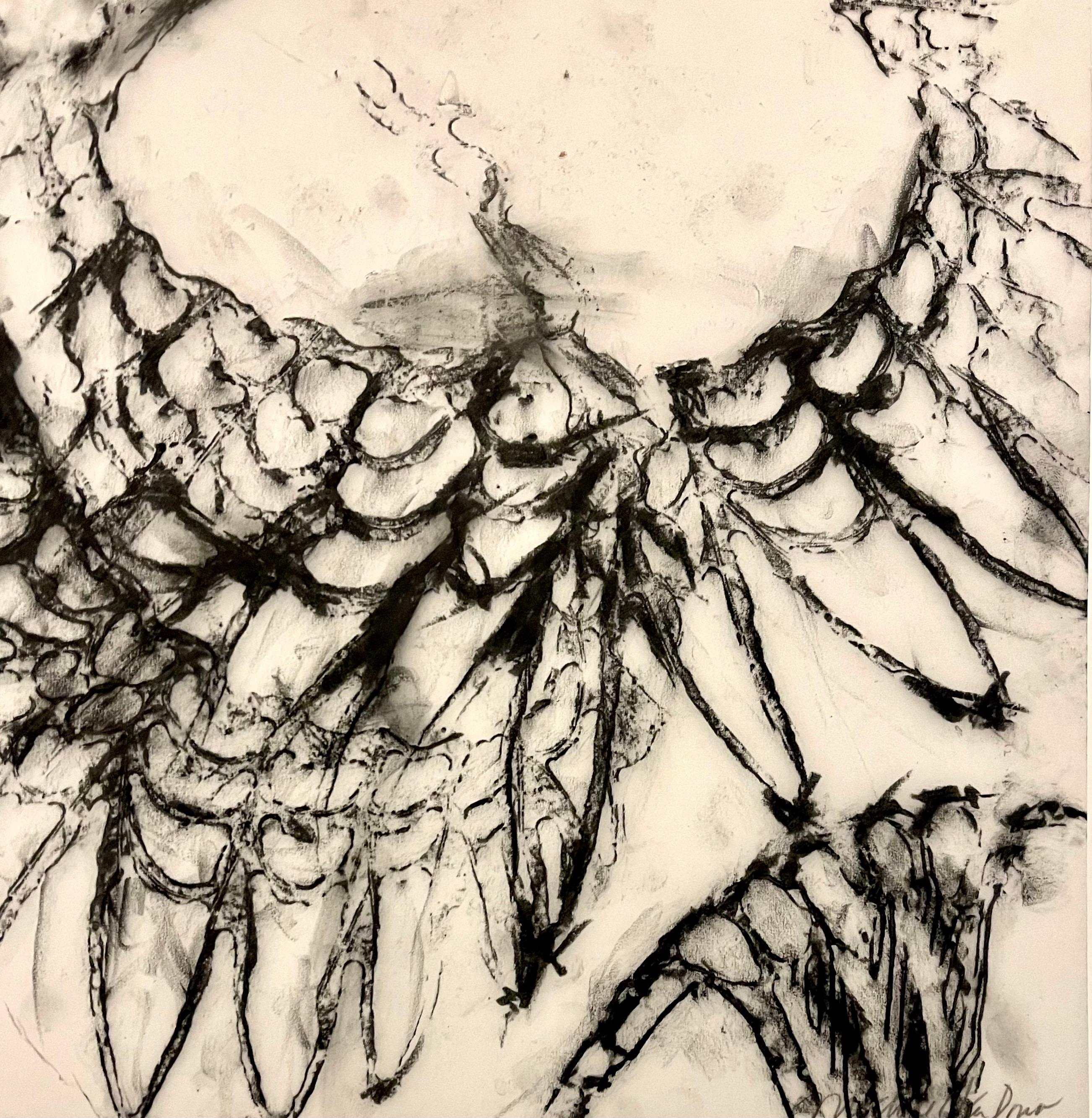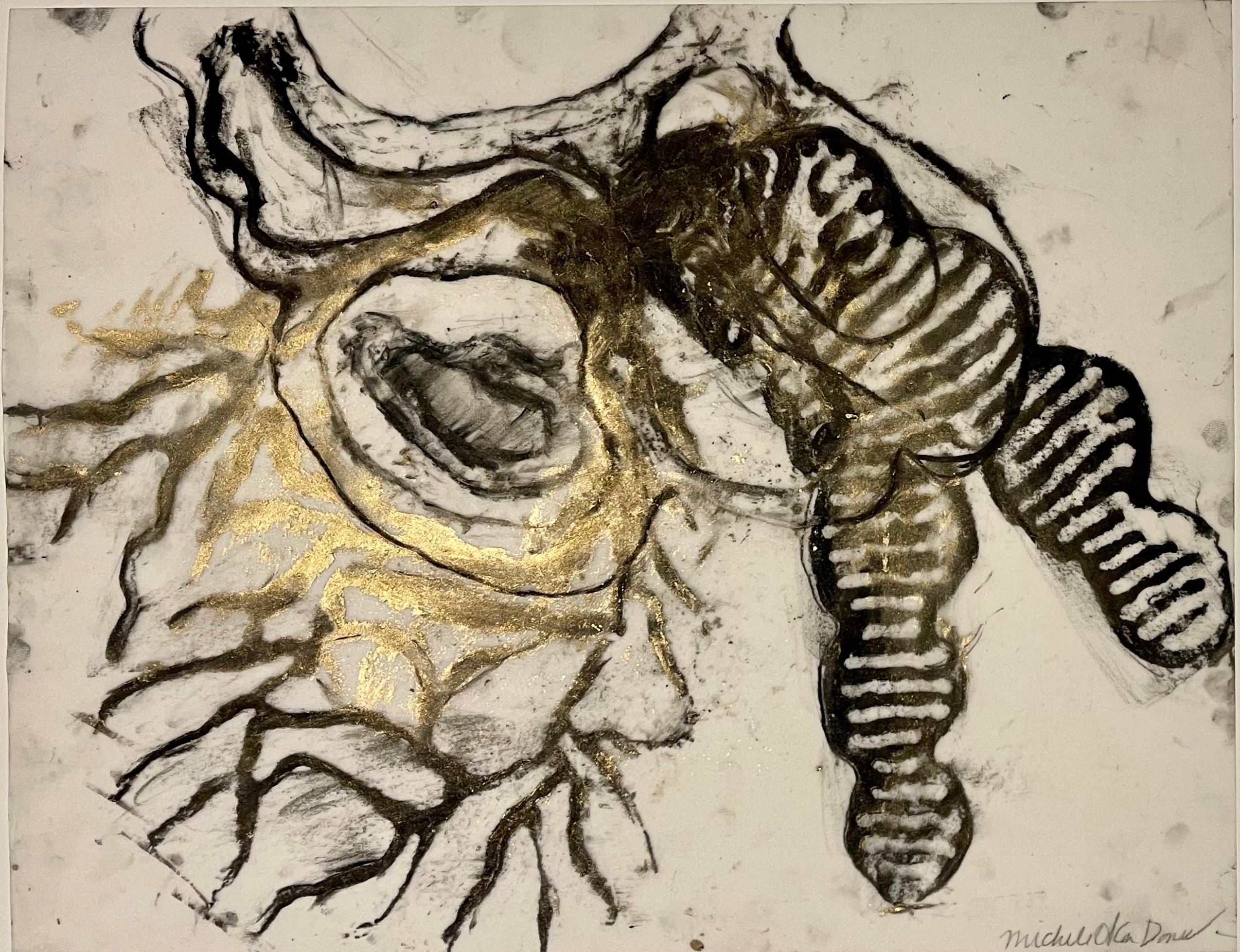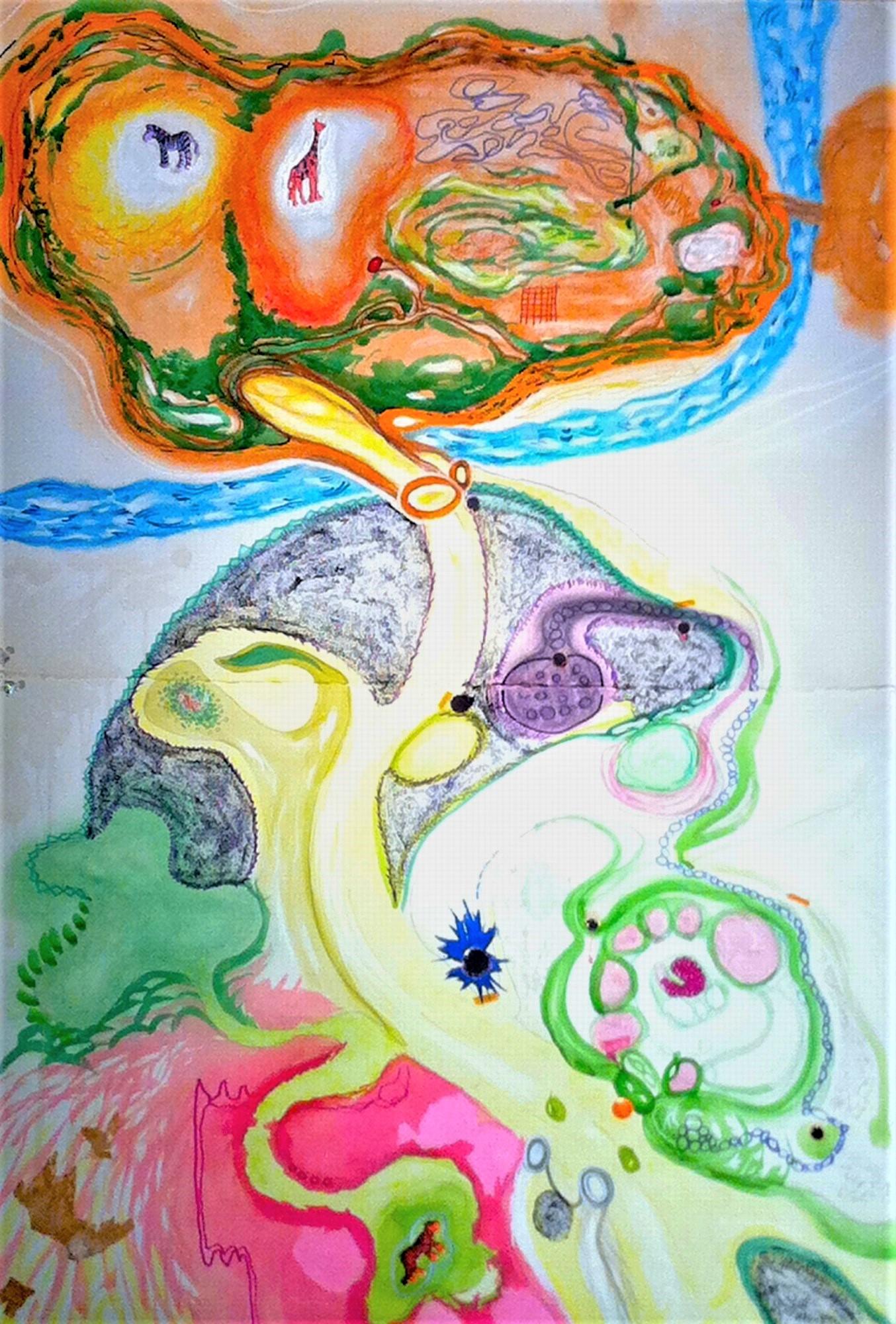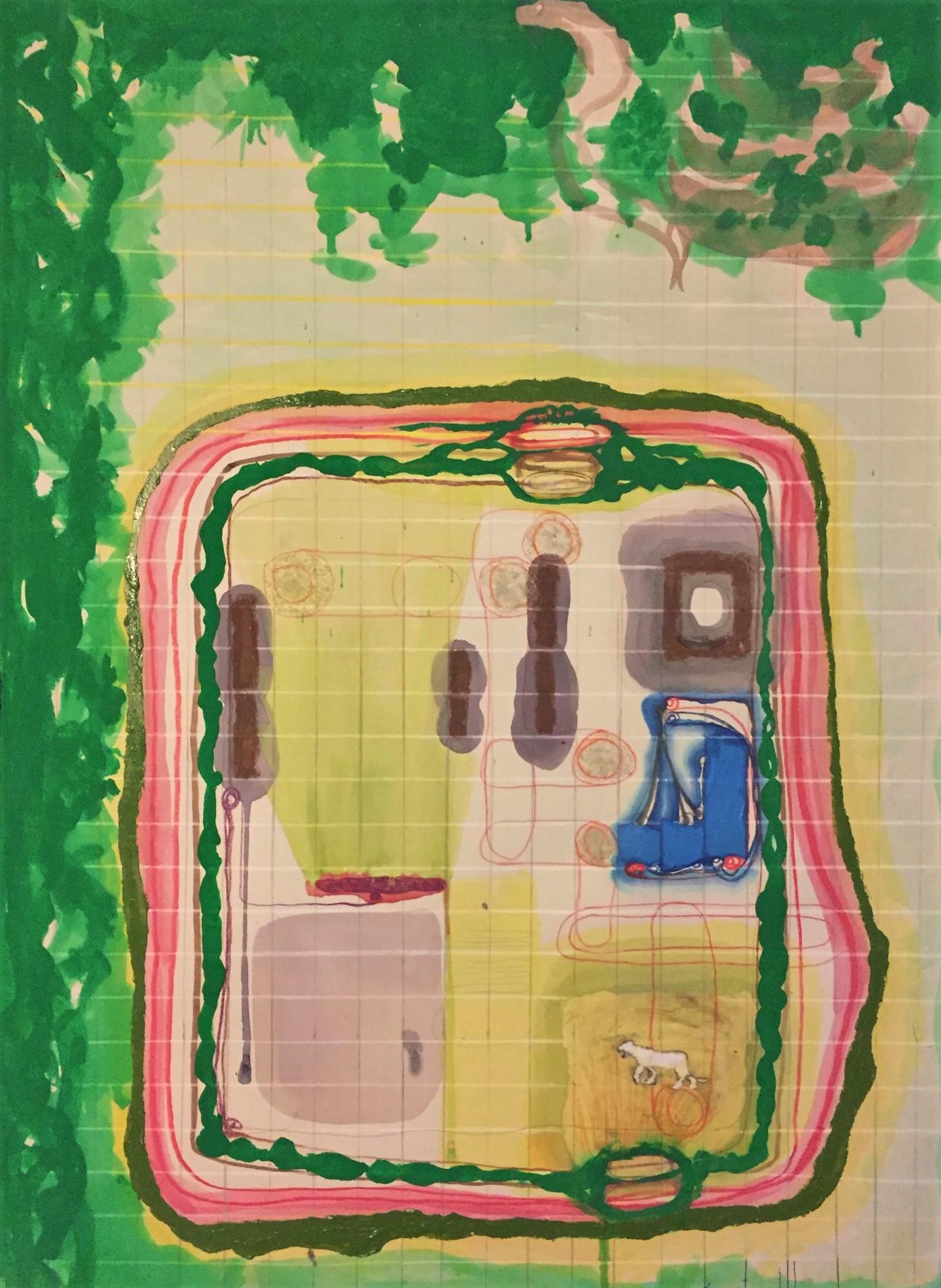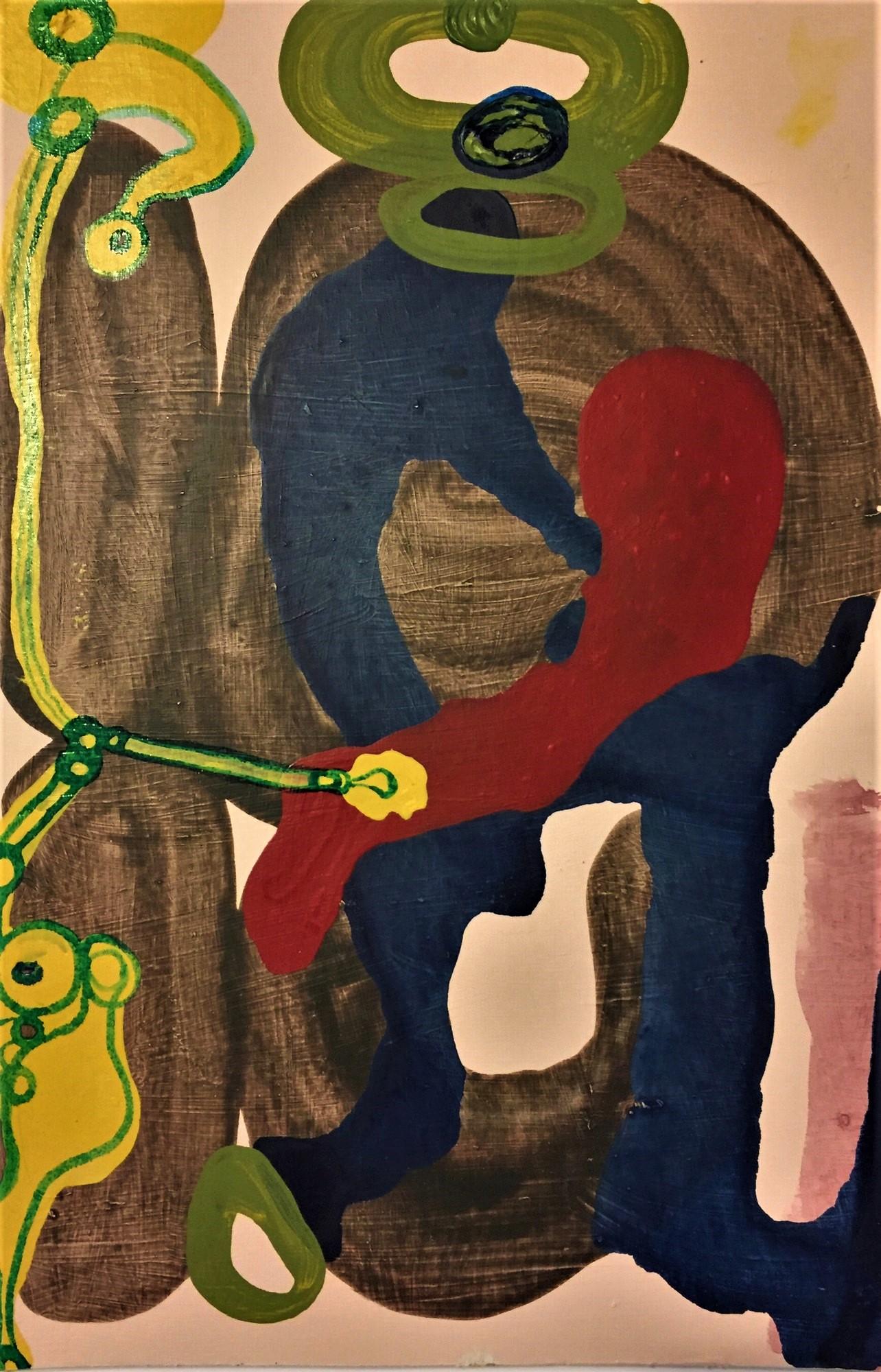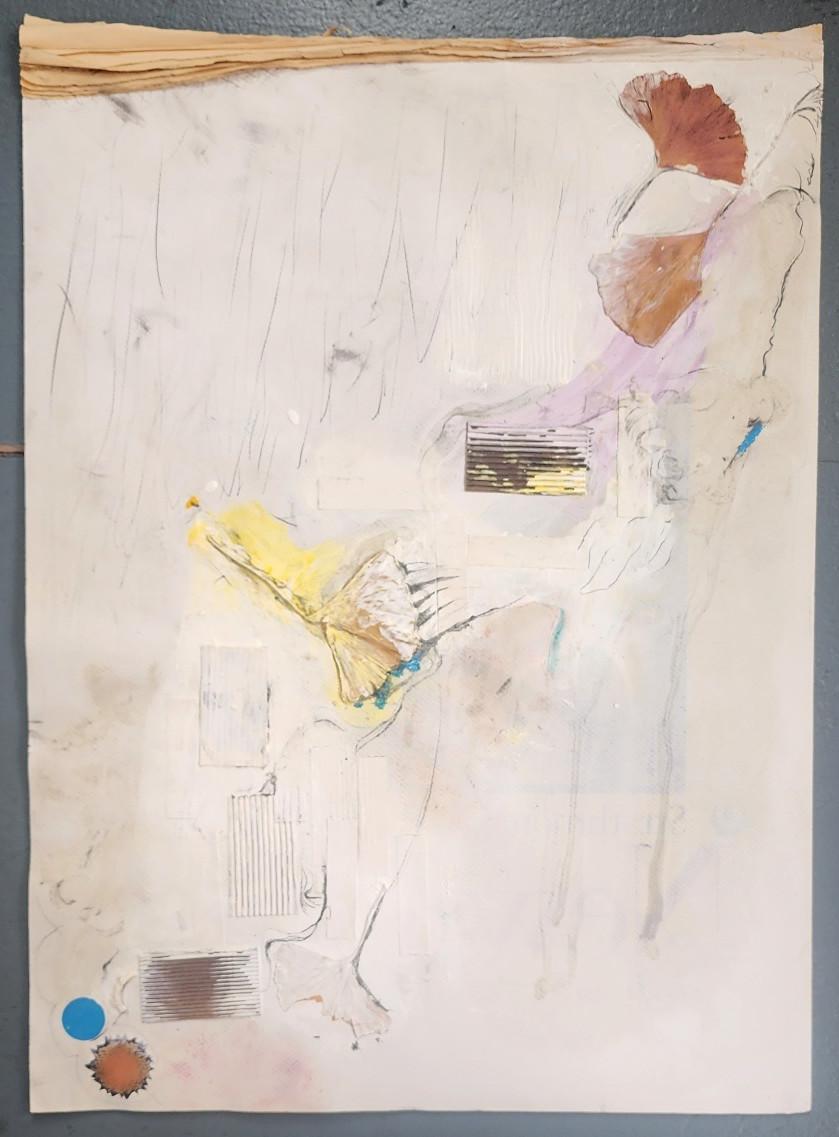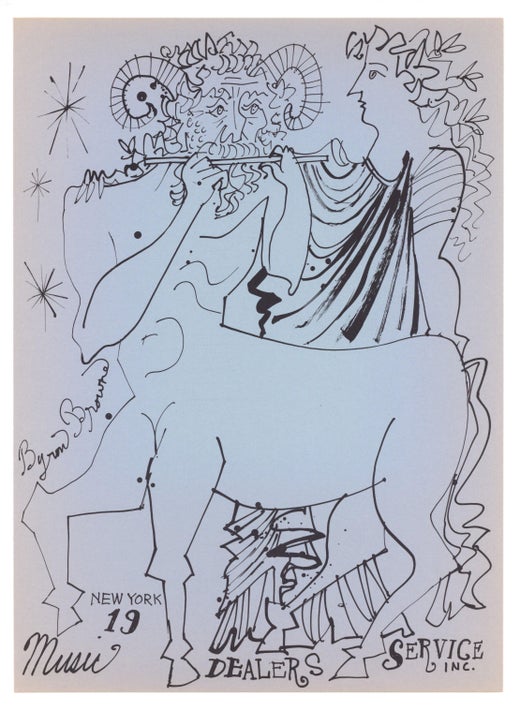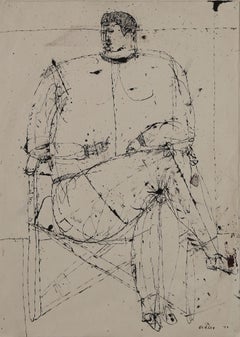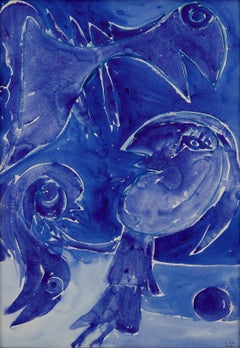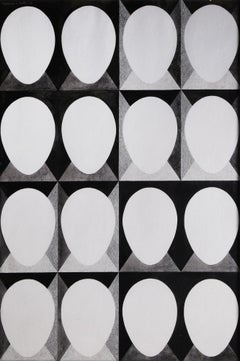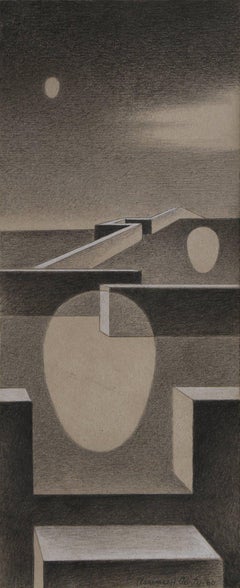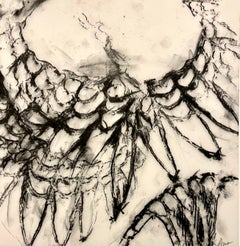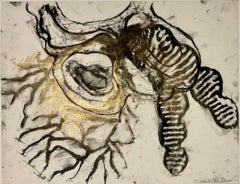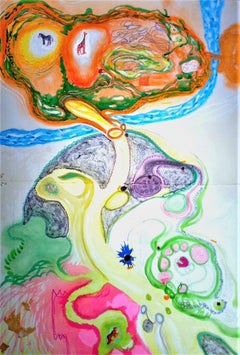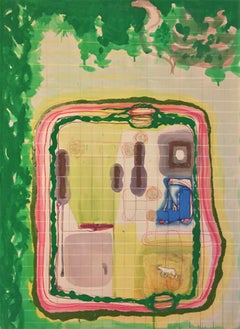Items Similar to Early 20th Century Abstract Collage by New York Artist
Want more images or videos?
Request additional images or videos from the seller
1 of 10
Byron BrowneEarly 20th Century Abstract Collage by New York Artist1933
1933
About the Item
Byron Browne (American, 1907-1961)
Abstract Collage, 1933
Collage, charcoal and ink on paper
Signed and dated lower middle
16 x 19.5 inches
24 x 29 inches, framed
Byron Browne was a central figure in many of the artistic and political groups that flourished during the 1930s. He was an early member of the Artists' Union, a founding member of the American Abstract Artists, and participated in the Artists' Congress until 1940 when political infighting prompted Browne and others to form the break-away Federation of Modern Painters and Sculptors. Browne's artistic training followed traditional lines. From 1925 to 1928, he studied at the National Academy of Design, where in his last year he won the prestigious Third Hallgarten Prize for a still-life composition. Yet before finishing his studies, Browne discovered the newly established Gallery of Living Art. There and through his friends John Graham and Arshile Gorky, he became fascinated with Picasso, Braque, Miró, and other modern masters.
The mid 1930s were difficult financially for Browne.(1) His work was exhibited in a number of shows, but sales were few. Relief came when Burgoyne Diller began championing abstraction within the WPA's mural division. Browne completed abstract works for Studio D at radio station WNYC, the U.S. Passport Office in Rockefeller Center, the Chronic Disease Hospital, the Williamsburg Housing Project, and the 1939 World's Fair.(2)
Although Browne destroyed his early academic work shortly after leaving the National Academy, he remained steadfast in his commitment to the value of tradition, and especially to the work of Ingres.(3) Browne believed, with his friend Gorky, that every artist has to have tradition. Without tradition art is no good. Having a tradition enables you to tackle new problems with authority, with solid footing.(4)"
Browne's stylistic excursions took many paths during the 1930s. His WNYC mural reflects the hard-edged Neo-plastic ideas of Diller, although a rougher Expressionism better suited his fascination for the primitive, mythical, and organic. A signer, with Harari and others, of the 1937 Art Front letter, which insisted that abstract art forms "are not separated from life," Browne admitted nature to his art—whether as an abstracted still life, a fully nonobjective canvas built from colors seen in nature, or in portraits and figure drawings executed with immaculate, Ingres-like finesse.(5) He advocated nature as the foundation for all art and had little use for the spiritual and mystical arguments promoted by Hilla Rebay at the Guggenheim Collection: When I hear the words non-objective, intra-subjective, avant-garde and such trivialities, I run. There is only visible nature, visible to the eye or, visible by mechanical means, the telescope, microscope, etc."(6)
Increasingly in the 1940s, Browne adopted an energetic, gestural style. Painterly brushstrokes and roughly textured surfaces amplify the primordial undercurrents posed by his symbolic and mythical themes. In 1945, Browne showed with Adolph Gottlieb, William Baziotes, David Hare, Hans Hofmann, Carl Holty, Romare Bearden, and Robert Motherwell at the newly opened Samuel Kootz Gallery. When Kootz suspended business for a year in 1948, Browne began showing at Grand Central Galleries. In 1950, he joined the faculty of the Art Students League, and in 1959 he began teaching advanced painting at New York University.
1. When she met him in October 1934, Rosalind Bengelsdorf Browne recalled that her future husband's daily diet consisted of a quart of milk, a box of cornmeal, a head of lettuce, and some raisins. See Rosalind Bengelsdorf Browne Papers, Archives of American Art, Smithsonian Institution, Washington, D.C.
2. Browne was also involved with Léger's mural project for the French Line terminal building that was canceled after officials discovered Léger's communist sympathies. See Rosalind Bengelsdorf Browne Papers, Archives of American Art, Smithsonian Institution, Washington, D.C.
3. The abstract quality of Ingres's work held special appeal not only for Browne, but for John Graham and Arshile Gorky. Rosalind Bengelsdorf Browne remembered Gorky waving an Ingres reproduction around at the opening of the first American Abstract Artists annual exhibition and proclaiming that the French master was more "abstract" than all the work in the exhibition. See Rosalind Bengelsdorf Browne Papers, Archives of American Art, Smithsonian Institution, Washington, D.C.
4. Gorky is quoted in Melvin P. Lader, "Graham, Gorky, de Kooning and the "Ingres Revival" in America," Arts Magazine 52, no. 7 (March 1978): 99.
5. The classical drawings, a group of which was exhibited at Washburn Gallery in 1977, show heads (often of cross-eyed women) and classically garbed and garlanded seated figures. They have important stylistic parallels to John Graham's paintings and drawings of the period.
6. Quoted in Gail Levin, "Byron Browne in the Context of Abstract Expressionism," Arts Magazine 59, no. 10 (Summer 1985): 129. Browne's notebook is in the collection of his son Stephen B. Browne. Theidea of portraying matter visible through telescope or microscope parallels the fusion of scientific and artistic vision discussed by Rosalind Bengelsdorf.
Virginia M. Mecklenburg The Patricia and Phillip Frost Collection: American Abstraction 1930–1945 (Washington, D.C.: Smithsonian Institution Press for the National Museum of American Art, 1989)
- Creator:Byron Browne (1907-1961, American)
- Creation Year:1933
- Dimensions:Height: 24 in (60.96 cm)Width: 29 in (73.66 cm)
- Medium:
- Movement & Style:
- Period:
- Condition:
- Gallery Location:Beachwood, OH
- Reference Number:1stDibs: LU1768215795242
Byron Browne
Byron Browne (1907-1961) was an American painter and founding member of the American Abstract Artists. Browne was born on June 26, 1907 in Yonkers, New York. He studied at the National Academy of Design from 1925 to 1928. He was a member of the Artists Union. In 1936 he was one of the founding members of the American Abstract Artists. He created murals under the auspices of the Works Progress Administration for the Chronic Disease Hospital and the 1939 New York World's Fair. In 1940 he married fellow artist Rosalind Bengelsdorf. He taught painting at the Art Students League of New York from 1948 through 1959 and went on to teach at New York University. He died on December 25, 1961 in New York City. Browne's work is included in the collections of the Art Institute of Chicago,[5] the Museum of Modern Art, the Philadelphia Museum of Art, the Smithsonian American Art Museum, and the Whitney Museum of American Art.
About the Seller
5.0
Vetted Professional Seller
Every seller passes strict standards for authenticity and reliability
Established in 1975
1stDibs seller since 2022
24 sales on 1stDibs
Typical response time: 9 hours
- ShippingRetrieving quote...Shipping from: Beachwood, OH
- Return Policy
Authenticity Guarantee
In the unlikely event there’s an issue with an item’s authenticity, contact us within 1 year for a full refund. DetailsMoney-Back Guarantee
If your item is not as described, is damaged in transit, or does not arrive, contact us within 7 days for a full refund. Details24-Hour Cancellation
You have a 24-hour grace period in which to reconsider your purchase, with no questions asked.Vetted Professional Sellers
Our world-class sellers must adhere to strict standards for service and quality, maintaining the integrity of our listings.Price-Match Guarantee
If you find that a seller listed the same item for a lower price elsewhere, we’ll match it.Trusted Global Delivery
Our best-in-class carrier network provides specialized shipping options worldwide, including custom delivery.More From This Seller
View AllSeated Figure, 20th century figural abstract expressionist ink drawing
By Joseph Glasco
Located in Beachwood, OH
Joseph Glasco (American, 1925-1996)
Seated Figure
1970
India ink on paper
16 x 11.5 inches
Signed and dated lower right
Joseph Glasco was born in Paul’s Valley, Oklahoma and grew up...
Category
1970s Abstract Expressionist Figurative Drawings and Watercolors
Materials
India Ink
The Blue Earth II, CoBrA movement, Mid-20th Century Danish Watercolor
By Carl-Henning Pedersen
Located in Beachwood, OH
Carl-Henning Pedersen (Denmark, 1913 - 2007)
The Blue Earth II, 1971
Watercolor on paper
Signed and dated lower right, signed, dated and titled verso
30.5 x 21.5 inches
Carl-Henning Pedersen was born in Copenhagen in 1913. At an early age he began taking part in politics, first in the youth association of social democrats and later in the youth association of communists, which better suited his revolutionary activist nature against fascism. In 1933, he attended the public high school of Humblebaek where he met the painter Else Alfelt, who he would marry in 1934 and with whom he would have two daughters. For many years the family divided its time between Copenhagen and the city of Bovbjerg, located on the North Sea, where Carl and Else had a studio. Between 1935 and 1940, Pedersen started to sketch and paint.
He exhibited for the first time, together with his wife, in “Kunstnernes Efterårsudstilling” (The Artists' Fall Exhibition) in Copenhagen in 1936. Pedersen associated with the young painters close to abstract movements, and like them, worked under difficult conditions. He went to Paris in 1939, where he encountered the work of Picasso, Matisse and Chagall.
Between 1940 and 1945, he contributed to the journal Helhesten. In the same journal, Pedersen published the text "Arte astratta o arte immaginaria," that supplied the most complete and precise definition, up to that point, of the work principles of the young generation of painters, of which he was a part. This definition, in many ways, was close to that which would be the program of the group Cobra. Between 1945 and 1960, the Danish artists went abroad and, along with Dutch and Belgian artists, founded the group Cobra, which was active between 1948 and 1951. During this period in 1948, Pedersen participated in the Biennial of Venice. He exhibited extensively with Cobra in shows such as its first important show which was held at the Stedelijk Museum of Amsterdam in 1949, “International Experimental Art.” Afterwords, Pedersen distanced himself from the group and began to travel frequently. His destinations included Greece, Italy, France, Switzerland, Norway, Lapland, Iceland, Turkey, Nepal, and Jerusalem.
He received the Eckersberg Award in 1950 from the Royal Danish Academy of Art. In 1952, he participated in “Contemporary Drawings from 12 Countries, 1945/1952,” an exhibition held at the Toledo Museum of Art in Toledo, Ohio, the exhibition also traveled to other museums in the United States, while in 1955, he took part in the group exhibition “Expressionism 1900/1955,” at the Walker Art Center in Minneapolis (also a traveling exhibition throughout the United States).
He participated in the 1952, 1955, 1958, 1961, 1964, and 1967 editions of “The Pittsburgh International Exhibition of Contemporary Painting and Sculpture” at the Museum of Art of the Carnegie Institute in Pittsburgh. The same museum also honored him with solo exhibitions in 1961 and 1968. In 1966, he exhibited at the Solomon R. Guggenheim Museum of New York in the show “European Drawings” that also traveled to Hawaii, Canada, Argentina, and Germany. In 1967, he showed at the “2. Internationale der Zeichnung” in Darmstadt, and then in 1968, he participated in the Premio Marzotto and the “Exhibition of Expressionist Art after 1950” at the Kunstmuseum of Lucerne, which then toured in Romania, Australia, Belgium, and Finland.
Pedersen received the medal of Prince Eugen in 1980, and he participated in the exhibition “Danish Artists, Carl-Henning Pedersen, Else Alfelt, Egil Jacobsen...
Category
1970s Abstract Expressionist Figurative Drawings and Watercolors
Materials
Watercolor
"People" - Mid-Century Ovoid Geometrical Abstract Black & White Drawing
By Clarence Holbrook Carter
Located in Beachwood, OH
Clarence Holbrook Carter (American, 1904-2000)
People, 1964
Ink and crayon on paper
Signed and dated upper right
36.5 x 24 inches
Clarence Holbrook Carter achieved a level of nation...
Category
1960s American Modern Abstract Drawings and Watercolors
Materials
Crayon, Ink
Study for Worlds Beyond - Surrealist graphite drawing, Ohio artist
By Clarence Holbrook Carter
Located in Beachwood, OH
Clarence Holbrook Carter (American, 1904-2000)
Study for Worlds Beyond, 1980
Graphite, collage and white heightening on illustration board
Signed and dated lower right
10.75 x 4.5 in...
Category
1980s American Modern Figurative Drawings and Watercolors
Materials
Graphite
Reclining Nude Male Figure, figural expressionist New York artist ink drawing
By Joseph Glasco
Located in Beachwood, OH
Joseph Glasco (American, 1925-1996)
Reclining Male Figure (For Nick)
1971
India ink on paper
Inscribed, signed and dated
10.25 x 14 inches
Joseph Glasco was born in Paul’s Valley, O...
Category
1970s Abstract Expressionist Figurative Drawings and Watercolors
Materials
India Ink
Standing Figure, figural abstract expressionist ink drawing, 20th century
By Joseph Glasco
Located in Beachwood, OH
Joseph Glasco (American, 1925-1996)
Figure
1955
Ink on paper
Signed and dated lower center
9 x 12 inches
Joseph Glasco was born in Paul’s Valley, Oklahoma and grew up in Texas. In 1...
Category
1950s Abstract Expressionist Figurative Drawings and Watercolors
Materials
Ink
You May Also Like
Original Drawing Painting Abstract Biomorphic Art Phoenix Bird Michele Oka Doner
By Michele Oka Doner
Located in Surfside, FL
This is mixed media. I am not positive of the materials. it is a translucent, vellum, parchment type of paper. with either charcoal or ink, hand signed in pencil lower right.
It is not titled on it.
Michele Oka Doner (born 1945, Miami Beach, Florida, United States) is an American artist and author who works in a variety of media including sculpture, lithograph and woodcut prints, drawing, watercolor painting, functional objects and video. Her workes is based on flora, fauna, DNA and all sorts of exotica. She has also worked in costume and set design and has created over 40 public and private permanent art installations, including her best known artwork is "A Walk on the Beach" (1995, 1999), and its extension, "A Walk on the Beach: Tropical Gardens" (1996–2010) at the Miami International Airport. It is composed of over 9000 bronzes embedded in terrazzo with mother-of-pearl. At one and quarter linear miles, it is one of the largest artworks in the world.
Born and raised in Miami Beach, Oka Doner is the granddaughter of painter Samuel Heller. Oka Doner's father, Kenneth Oka, was elected judge and mayor of Miami Beach during her youth (1945–1964). The family lived a public and politically active life. In later years, Oka Doner co-authored, with Mitchell Wolfson Jr. Miami Beach: Blueprint of an Eden, an intimate portrayal of Miami Beach from the 1920s to the 1960s using their families as prisms to reflect the times. Reviewed as classic of social history, with material that was part of the public record of its time, it was used as a textbook in Human Geography at George Washington University in 2008.
In 1957, age 12, Oka Doner began a year-long independent project studying the International Geophysical Year (IGY). She assembled a book of drawings, writings and collages that became a template for projects realized in later years. In 1963, Oka Doner left Florida for the University of Michigan, Ann Arbor. Her art instructor Milton Cohen...
Category
Early 2000s Abstract Abstract Drawings and Watercolors
Materials
Gold Leaf
Original Drawing Painting Abstract Biomorphic Art Gold Leaf Michele Oka Doner
By Michele Oka Doner
Located in Surfside, FL
This is mixed media. I am not positive of the materials. it is a translucent, vellum, parchment type of paper. with either charcoal or ink and gold leaf (or gold paint) hand signed in pencil lower right.
It is not titled on it.
Michele Oka Doner (born 1945, Miami Beach, Florida, United States) is an American artist and author who works in a variety of media including sculpture, lithograph and woodcut prints, drawing, watercolor painting, functional objects and video. Her workes is based on flora, fauna, DNA and all sorts of exotica. She has also worked in costume and set design and has created over 40 public and private permanent art installations, including her best known artwork is "A Walk on the Beach" (1995, 1999), and its extension, "A Walk on the Beach: Tropical Gardens" (1996–2010) at the Miami International Airport. It is composed of over 9000 bronzes embedded in terrazzo with mother-of-pearl. At one and quarter linear miles, it is one of the largest artworks in the world.
Born and raised in Miami Beach, Oka Doner is the granddaughter of painter Samuel Heller. Oka Doner's father, Kenneth Oka, was elected judge and mayor of Miami Beach during her youth (1945–1964). The family lived a public and politically active life. In later years, Oka Doner co-authored, with Mitchell Wolfson Jr. Miami Beach: Blueprint of an Eden, an intimate portrayal of Miami Beach from the 1920s to the 1960s using their families as prisms to reflect the times. Reviewed as classic of social history, with material that was part of the public record of its time, it was used as a textbook in Human Geography at George Washington University in 2008.
In 1957, age 12, Oka Doner began a year-long independent project studying the International Geophysical Year (IGY). She assembled a book of drawings, writings and collages that became a template for projects realized in later years. In 1963, Oka Doner left Florida for the University of Michigan, Ann Arbor. Her art instructor Milton Cohen...
Category
Early 2000s Abstract Abstract Drawings and Watercolors
Materials
Gold Leaf
Biogram of the Kansas City Zoo
By Kory Twaddle
Located in Kansas City, MO
Artist : Kory Twaddle
Title : Biogram of the Kansas City Zoo
Materials : Pastel, oil pastel, acrylic, watercolor, gouache, tempera, glitter glue, foam stickers, paper, marker, color...
Category
2010s Abstract Mixed Media
Materials
Paint, Paper, Conté, Charcoal, India Ink, Acrylic, Tempera, Watercolor, ...
Price Upon Request
Blue Springs Semi Upper Level
By Kory Twaddle
Located in Kansas City, MO
Artist : Kory Twaddle
Title : Blue Springs Semi Upper Level
Materials : Colored pencil, marker, tempera, gouache, stickers, tape, glitter glue, pastel, oil pastel, acrylic, graphite...
Category
2010s Abstract Geometric Mixed Media
Materials
Paint, Paper, Conté, Charcoal, India Ink, Acrylic, Tempera, Watercolor, ...
Price Upon Request
Basement Systems
By Kory Twaddle
Located in Kansas City, MO
Artist : Kory Twaddle
Title : Basement Systems
Materials : Acrylic, tempera, gouache, and glitter glue on cardboard drawing pad back
Date : 2019
Dimensions : 18 x 12 x .2 in.
Kory ...
Category
2010s Abstract Expressionist Mixed Media
Materials
Paint, Paper, Conté, Charcoal, India Ink, Acrylic, Tempera, Watercolor, ...
Price Upon Request
Autumn Biogram of the Nelson
By Kory Twaddle
Located in Kansas City, MO
Artist : Kory Twaddle
"Autumn Biogram of the Nelson"
Newsprint, graphite, conté crayon pastel, charcoal, beeswax, cardboard, paper, gingko leaves, stickers, and Mixed Media on drawi...
Category
2010s Abstract Mixed Media
Materials
Paint, Paper, Conté, Charcoal, India Ink, Acrylic, Tempera, Watercolor, ...
Recently Viewed
View AllMore Ways To Browse
1930s New York
Vintage Collage Artists
New York Worlds Fair 1939
20th Century Collage
Vintage 1939 New York Worlds Fair
Buildings Collage
1940s French Drawings
Picasso 1930s
Line Drawing Of Women
Vintage Notebook
American Primitive Gallery
Picasso 1933
Mid Century Radio
Mid Century Radios
David Samuels
Vintage Letter B
Gorky Arshile
Hans Harders
